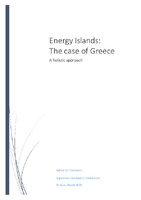| dc.description.abstractEN | Over the years, islands have become overly dependent and vulnerable to traditional energy lines. Great importance has to be laid down to their energy resources to help them achieve sustainability and energy independence, constituting them self-sufficient. Thus, islands become part of the European energy transition and the zero-emissions EU initiative until 2050. As a consequence of the environmentally friendly directives of the EU, the traditional centralized energy production facilities are gradually being replaced with distributed, heterogeneous, multidirectional, and smart energy systems. Often serve as ‘‘test subjects’’ for new technologies and their performance. As a key figure, the European Commission, encourages research and innovation in the energy field. States and industrial actors have identified islands as key energy transition sites because their distinctive isolation characterizes them compared to main-lands. Therefore, energy routes are to be made to facilitate their needs. Also, these islands can easily, with the available technology, abstain from the traditional production of energy from fossil fuel to emission-free renewable energy sources that could include hybrid models of energy production. The energy transitions should actively work to anchor initiatives solving additionally local concerns and localized issues. Many Islands of the EU, despite having access to renewable sources of energy, still depend on expensive fossil fuel imports for their energy supply. The European Commission has launched the ‘‘Clean Energy for EU Islands Initiative’’ as part of the ‘‘Clean Energy for all Europeans’’ package. One of the primary instruments of this initiative is the European Islands Facility (NESOI), which aims to create through innovation and subsidies clean energy projects across the EU islands. Plentiful projects are already underway in the EU and Greece, including the Astypalea project of Volkswagen, the Tilos project, the ESBØ project in Norway and Sweden, and older projects such as the Samsø project in the Netherlands and the El Hierro in Spain, which are some of the many innovative projects that led the way in R&D for establishing independent islands. Nevertheless, are these projects sustainable and energy-wise secure? Do they hold geopolitical importance for Greece? What legal aspects could an energy contract of this magnitude entail? There are many questions around the subject of energy islands that are to be answered in a theoretical way to depict the importance of governance, the legal dimension of energy security, while assessing the factor of energy sustainability and evaluating the legal environment of these pioneering projects via the use of various indexes. Most importantly, are the EU projects equivalent to other initiatives worldwide, such as Hawaii and Maldives, or does the Union need to reconsider and recalibrate them, especially due to the Covid-19 pandemic and its’ economic stagnation? Where should the weight be shifted, and how energy exploitation contracts can be sustainable and durable under almost any circumstances? | el |



